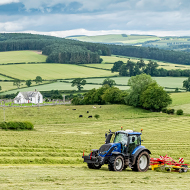
"It is essential that veterinary expertise and advice is at the heart of any new system" - James Russell, BVA president.
The British Veterinary Association (BVA) has welcomed the passing of the Government's Agriculture Bill into UK law.
The Agriculture Bill sets out how farmers and land managers in England will be rewarded in the future with public money for “public goods”, such as better air and water quality, measures to reduce flooding and higher animal welfare standards.
A transition period will begin at the start of 2021, giving farmers a seven-year transition period to adapt to the new agricultural system. Further details about the Bill are expected to be announced in late November.
BVA President James Russell said: “We’re glad to see that the Agriculture Bill has now passed into law. Although it does not include all the assurances that we had hoped for on international trade deals, it is important that the remit of the Trade and Agriculture Commission has been strengthened. We are keen to engage with the Commission in the future to make sure that the breadth of veterinary expertise is heard.
“One of the most important elements of the Agriculture Act is how England will deliver its post-CAP policy. BVA secured assurances early on that animal health and welfare would be considered public goods and we are pleased to be involved in discussions about how this will be delivered, in practice."
He added: “It is essential that veterinary expertise and advice is at the heart of any new system to ensure that we continue to build on and protect UK standards of animal health and welfare and safeguard public health.”
Environment secretary George Eustice said: “Our landmark Agriculture Act will transform the way we support farmers.
"The funds released as a result of the phasing out of the legacy Basic Payment Scheme (BPS) will be re-invested into a roll out of our future farming policy, which will be centred around support aimed at incentivising sustainable farming practices, creating habitats for nature recovery and supporting the establishment of new woodland and other ecosystem services to help tackle challenges like climate change.”



 The Federation of Independent Veterinary Practices (FIVP) has announced a third season of its podcast, Practice Matters.
The Federation of Independent Veterinary Practices (FIVP) has announced a third season of its podcast, Practice Matters.